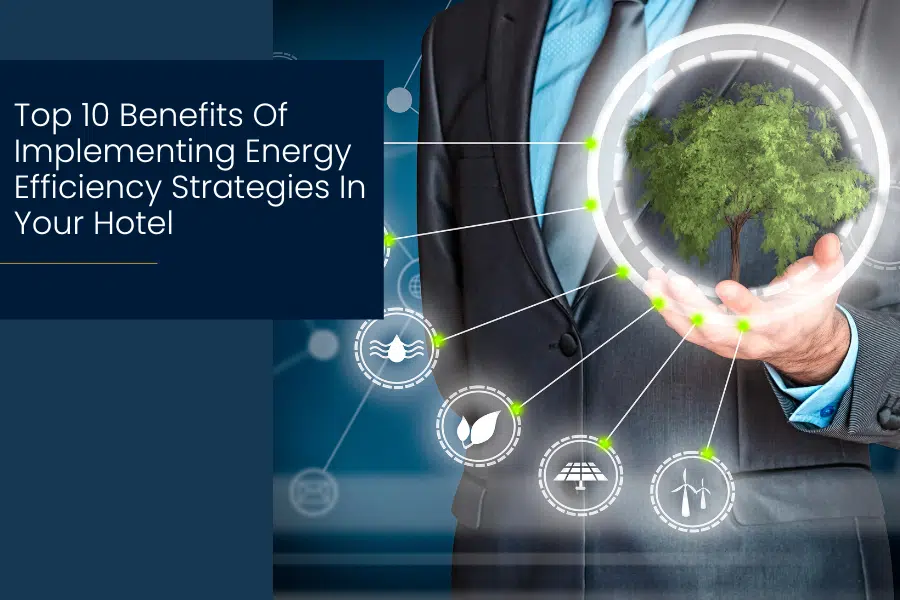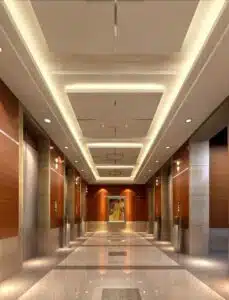Implementing energy efficiency strategies in a 5-star hotel can yield several benefits, both for the hotel itself and for the environment. Here are some of the key advantages:
1. Cost Savings and Hospitality
Energy-efficient practices, including LED lighting, advanced HVAC systems, and optimal building insulation, not only enhance hospitality but also result in significant cost savings, reducing utility expenses for hotels
2. Enhanced Profit Margins for Sustainable Hotels
By reducing operational costs through sustainable energy practices, hotels can improve profit margins, reinforcing their commitment to sustainability and guest satisfaction.
3. Improved Guest Comfort and Eco-Friendly Stays
Energy-efficient HVAC systems maintain consistent, eco-friendly comfort levels, providing guests with a delightful and sustainable experience during their stay.
 4. Eco-Conscious Travelers and Environmental Responsibility
4. Eco-Conscious Travelers and Environmental Responsibility
Eco-conscious travellers increasingly seek environmentally responsible accommodations. Implementing energy efficiency strategies allows hotels to reduce their carbon footprint, demonstrating a strong commitment to environmental sustainability.
5. Competitive Advantage in Sustainable Hospitality

6. Regulatory Compliance and Luxury Green Standards
Energy efficiency measures ensure compliance with strict energy regulations and uphold luxury green standards, reducing the risk of regulatory penalties. It is expected that NABERS Ratings for hotels will become compulsory for hotels in the not-too-distant future.
7. Extended Equipment Lifespan and Sustainable Maintenance
Proper maintenance and energy-efficient operation extend the lifespan of hotel equipment, reducing the need for frequent replacements and contributing to long-term sustainability.
8. Resilience to Energy Price Fluctuations
Properties that embrace energy efficiency measures are less vulnerable to energy price fluctuations, providing financial stability during volatile market conditions.
 9. Positive Public Relations and Sustainable Branding
9. Positive Public Relations and Sustainable Branding
A strong commitment to energy efficiency and sustainability enhances a hotel’s public image, attracting environmentally conscious guests and partners while reinforcing its luxury branding.
10. Access to Incentives for Sustainable Hotels
Many governments and utility companies offer financial incentives, tax credits, and rebates to hotels adopting energy-efficient technologies and practices, further enhancing the return on investment for sustainable initiatives.
In summary, implementing energy efficiency strategies in your hotel can lead to cost savings, improved guest experiences, environmental benefits, and a competitive edge in the market. It aligns with sustainability goals, and regulatory compliance, and can even open doors to financial incentives, making it a smart and responsible choice for hotel operators.
If you are interested in implementing energy-efficient practices with a great ROI, please reach out, our experts will be very happy to assist you and suggest solutions that are perfect for your specific situation.
Need help considering or selecting the best technology for your Hotel and guests? Technology 4 Hotels can save you time and hassle, and help you increase your revenue. If you have feedback on this article or would like to connect, please get in touch via phone at +61 2 8317 4000, or book a time for a complimentary 15-minute Tech Chat, just click here.
Frequently Asked Questions
A: Energy-efficient HVAC (Heating, Ventilation, and Air Conditioning) systems play a pivotal role in enhancing both guest comfort and operational cost savings. These systems provide precise temperature control, maintaining a consistent and pleasant indoor environment for our guests. They also reduce energy consumption, resulting in lower utility bills and operational expenses, ultimately improving the hotel’s bottom line.
A: Hotels can benefit from sustainable lighting options such as LED (Light Emitting Diode) lighting. LED lights are not only energy-efficient but also offer customisable lighting solutions, allowing you to create the perfect ambience for different areas of the hotel. By transitioning to LED lighting, you can significantly reduce energy consumption while simultaneously enhancing the guest experience with optimal lighting conditions.
A: Yes, there are several prestigious green certifications and standards that a hotel can pursue. Notable examples include Ecotourism Australia, Green Star, NABERS, and EarthCheck. These certifications recognise and validate your commitment to environmental responsibility, making you an attractive choice for eco-conscious travellers seeking sustainable accommodations.
A: To minimise your carbon footprint and leverage financial incentives for renewable energy solutions, you can consider adopting solar panels, wind turbines, or other renewable energy sources. These investments not only align with sustainability goals but also demonstrate your commitment to eco-friendly practices. Government incentives and tax credits are often available for such initiatives, helping you achieve sustainability while preserving your brand reputation.
A: Staying current with sustainable trends and innovations is crucial to remaining competitive in the luxury market. Some key trends include smart room technology, water conservation measures, and sustainable sourcing of materials and products. By embracing these trends and incorporating energy-efficient practices throughout your operations, you can meet the expectations of discerning luxury travellers while reducing your environmental impact and operating costs.



 4. Eco-Conscious Travelers and Environmental Responsibility
4. Eco-Conscious Travelers and Environmental Responsibility 9. Positive Public Relations and Sustainable Branding
9. Positive Public Relations and Sustainable Branding